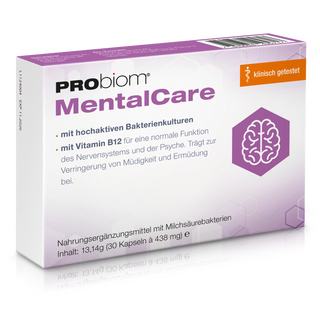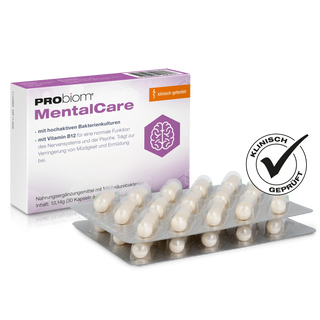Sleep is as vital to our lives as eating and drinking. Yet millions of people suffer from poor sleep, difficulty falling asleep, or waking up during the night. The reasons for this are varied – stress, bad habits, hormonal imbalances. But what many don't realize is that the gut also plays a significant role in good sleep .
In recent years, probiotics – live microorganisms that have a positive impact on our health – have emerged as a promising approach to improving sleep. But how exactly does this work? What role does the gut flora play? And which probiotics are truly helpful?
The gut as a second brain – more than just digestion
Our gut is home to around 100 trillion microorganisms —more than we have body cells. This so-called microbiome not only aids digestion but also communicates directly with the brain. This connection is known as the gut-brain axis and plays a central role in our mood, our immune system—and, of course, our sleep .
Communication takes place through three main channels:
-
Nerve pathways (e.g. vagus nerve) : Direct connection between the gut and the brain.
-
Immune system : Microbes influence inflammatory processes that can irritate the nervous system.
-
Hormone balance : Many neurotransmitters such as serotonin or GABA are produced in the intestine.
Interesting fact: Over 90% of the body’s serotonin – the precursor to the sleep hormone melatonin – is produced in the intestine.
Sleep and Microbiome: The Scientific Connection
Several studies in recent years have shown that people with a healthy and diverse intestinal flora tend to sleep better. However, a disturbed intestinal flora—e.g., due to an unhealthy diet, stress, or antibiotics—can contribute to sleep problems.
What research shows:
-
In 2019 , a study from Japan found that a disturbed microbiome is associated with increased cortisol (stress hormone) levels and poorer sleep quality.
-
In 2021 , researchers at the University of Colorado discovered that subjects with greater microbial diversity had more slow-wave sleep .
-
Animal experiments showed that mice without intestinal bacteria showed altered sleep behavior – they slept less deeply and were more sensitive to stress.
Probiotics – Little helpers with a big impact
Probiotics are live microorganisms that, when consumed in sufficient quantities, provide health benefits. They are found in fermented foods such as yogurt, kefir, sauerkraut, and kimchi, but also in capsule form as a dietary supplement.
Certain probiotic strains can specifically target the gut-brain axis —also known as psychobiotics . These bacteria support the production of calming neurotransmitters, reduce inflammation, and regulate stress responses—all key factors for restful sleep.
How probiotics improve sleep: The mechanisms
The effect of probiotics on sleep is complex. Here's an overview of the most important biological mechanisms:
| Mechanism of action | Influence on sleep |
|---|---|
| Serotonin production in the intestine | Promotes melatonin production, important for the sleep-wake rhythm |
| Regulation of cortisol levels | Less stress, better sleep |
| Improvement of the intestinal barrier | Less systemic inflammation, fewer nighttime awakenings |
| Production of GABA by certain strains | Promotes relaxation and relieves anxiety |
| Strengthening circadian rhythms | Stabilization of the internal clock |
| Influence on the immune system | Lower immune activity at night, which promotes deep sleep |
The best probiotic strains for better sleep
Not every probiotic works the same way. The positive effects on sleep are strain-specific —that is, it depends precisely on which microorganism is used.
Study-based, sleep-promoting probiotic strains:
-
Lactobacillus rhamnosus GG
-
Supports GABA production and reduces stress symptoms
-
-
Bifidobacterium longum 1714
-
Proven to relieve anxiety and promote sleep in studies
-
-
Lactobacillus helveticus R0052 & Bifidobacterium longum R0175 (combination)
-
Linked to improved sleep and less cortisol in human studies
-
-
Lactobacillus plantarum PS128
-
Modulates dopamine and serotonin in the nervous system, helpful for sleep problems
-
Practical tips for use
When and how should you take probiotics?
Most probiotics work best on an empty stomach , ideally 30 minutes before breakfast or bedtime .
Regular intake is crucial – single doses have little long-term effect . Noticeable changes will only become apparent after 2–4 weeks at the earliest.
Combine with prebiotic nutrition:
Probiotics need food to multiply in the gut. A prebiotic diet (e.g., with chicory, Jerusalem artichokes, oats, bananas) supports the colonization of beneficial bacteria.
Testimonials and reality
Many people report that after a few weeks of probiotic support they:
-
fall asleep faster
-
wake up less often at night
-
sleep more peacefully
-
wake up more refreshed
Of course, individual reactions vary. Some experience rapid improvement, others need to stick with it longer or try different strains.
Risks and side effects?
Probiotics are generally considered very safe , especially in healthy people. In the initial phase, temporary bloating, mild digestive discomfort, or changes in bowel habits may occur—this is usually a sign that the microbiome is adjusting.
People with a severely weakened immune system or serious underlying medical conditions should consult their doctor before taking it.
Probiotics alone are not enough – think holistically
As helpful as probiotics are, they are no substitute for a healthy lifestyle. Those who want to sleep better should also consider the following points:
-
Optimize sleep hygiene (e.g., set bedtimes, no blue light in the evening)
-
Reduce stress , e.g. through meditation, exercise or breathing exercises
-
Change your diet – less sugar, more fiber
-
Integrate exercise – ideally daily in the fresh air
-
Improve your sleeping environment – cool, dark, quiet
Conclusion: Probiotics as the key to better sleep?
Scientific evidence is growing: A healthy gut and a healthy microbiome promote better sleep. Probiotics can provide targeted support—especially if you choose the right strains and take them regularly.
They're not a miracle cure, but they're a powerful lever for holistically strengthening inner balance, stress resistance, and sleep quality. And the best part: Those who sleep well not only feel fitter—their gut also benefits. A true cycle of health!













